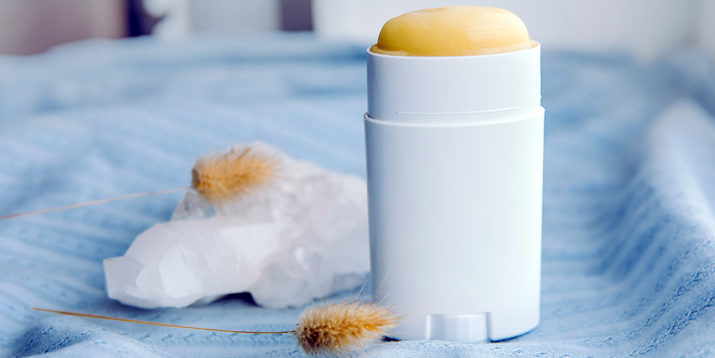Does Natural Deodorant Really Work?

Natural deodorants are everywhere now. Gone are the days when there was one brand in the personal-care aisle of the local health food store.
Now celebrities name-drop their favorite brands, and subscription-based companies deliver a range of scents.
Dr. Melissa Kanchanapoomi Levin, M.D., board-certified dermatologist and founder of Entière Dermatology, explains why most people reach for them:
- They’ve either had a skin reaction to antiperspirant ingredients.
- Or they prefer “clean” or naturally-derived beauty products.
Ditching a product that causes skin irritation is a no-brainer, but are natural deodorants a better replacement?
Not necessarily.
Dr. Levin says it’s a “false notion that ‘clean’ or naturally-derived products mean that they are safe and better.”
Here’s what you need to know.
What Is Natural Deodorant?
The term “natural deodorant” isn’t regulated, but Dr. Joshua Zeichner, M.D., associate professor of dermatology at Mount Sinai Hospital in New York, explains that “it typically refers to products that contain responsibly-sourced botanical ingredients and are free from parabens, sulfates, phthalates, and dyes.”
But he underscores that this differs from company to company.
Natural deodorants “block body odors by using different fragrances or anti-bacterial agents to address the bacteria that is responsible for body odor,” explains Dr. Levin.
They don’t, however, prevent sweating.
That’s the job of an antiperspirant, which she explains can “minimize sweat excretion by the use of salts such as aluminum.”
More specifically, classic antiperspirants “work using an aluminum salt that forms a plug within the sweat gland itself, preventing sweat from reaching the surface of the skin,” says Dr. Zeichner. “Most antiperspirants also have deodorant benefits,” he adds.
Antiperspirants with aluminum aren’t considered natural.
What Is the Most Effective Natural Deodorant?
“Find what works for you,” says Dr. Levin. Different people have different needs in a deodorant, so the “best” one depends on it addressing your unique concerns.
“For some, it’s not sweating at all; for others, it’s to mask odors after a good workout,” she adds.
Be ready to go through some trial and error and give each product you try a generous trial window.
You need to allow for some time because your armpits will go through a transition period. Though you may have heard this referred to as an “armpit detox,” that’s a bit of a misnomer.
An armpit or “antiperspirant detox” truly means “that the skin undergoes a transition to purge any aluminum salt plugs within the sweat glands,” Dr. Zeichner explains.
If you still have some aluminum plugs in your pores, you may not be able to accurately judge what type of natural deodorant you need.
Those plugs will still block sweat and odor to some degree. Once they’re all gone, you may find that the product you selected at first just doesn’t cut it.
That doesn’t mean it doesn’t work for you; you may just need a different formula.
What Natural Deodorant Actually Works?
To narrow down your search for the right natural deodorant for you, there are some ingredients to look for when shopping.
Dr. Zeichner explains that many such deodorants include:
- Silver-based compounds, which lower levels of odor-causing bacteria on the skin.
- Ingredients like charcoal, arrowroot powder, magnesium, or baking soda, which “have absorbent benefits to grab onto sweat on the surface of the skin.”
- Botanical ingredients, which use natural scent to mask body odor.
A product that combines all three is likely to be more effective than a natural deodorant with just one or two.
But, again, experimentation may be necessary.
It’s also a good idea to patch test, especially if you have sensitive underarms.
“Essential oils are commonly known irritants on the skin and can cause contact dermatitis,” cautions Dr. Levin. “In my clinical practice, I have seen many patients coming in with eczema and painful rashes from the use of natural deodorants.”
Is Natural Deodorant Actually Better for You?
Aluminum gets a bad reputation, but there isn’t enough evidence that these negative health claims are true.
“Despite much media attention and reports of small animal studies, there’s no data to prove that the aluminum salts used in antiperspirants are harmful to our health,” explains Dr. Zeichner. “In fact, antiperspirants are considered over-the-counter drugs and are subject to FDA regulations,” he adds.
There is one clear reason to avoid aluminum, however.
“Aluminum products can cause skin irritation as it is a salt,” Dr. Levin says, “and if that does occur, then avoidance would be recommended.”
What Can I Use Instead of Deodorant Naturally?
Dr. Levin cautions against trying lime or lemon juice or rubbing alcohol, both of which have been touted as alternatives to deodorant, because “these are known irritants and can cause irritation and rashes such as phytophotodermatitis and contact dermatitis.”
It’s possible to create a paste using baking soda and coconut oil, with or without essential oils for fragrance.
But you should always do a patch test before using baking soda since it can cause irritation.
You can also use mineral salts or a “crystal” deodorant.
If you have sensitive skin, though, many of these aren’t good bets.
Dr. Levin recommends “avoiding top irritants such as baking soda, alcohol, charcoal, essential oil, and coconut oil” if you have sensitive skin or eczema.
Keep in mind that these are also chemicals, though.
“There is a big consumer misconception that all-natural products are good and chemicals are bad, when in fact everything is a chemical and the dose makes the poison,” Dr. Levin says.
If you’re really concerned about what you’re using, talk it over with your dermatologist.


